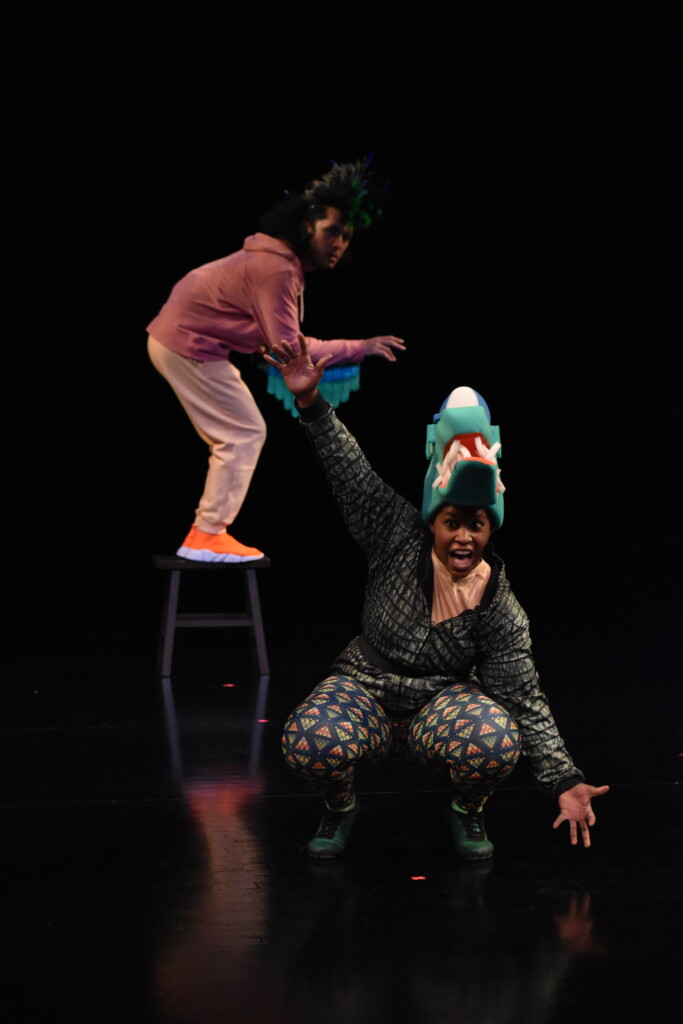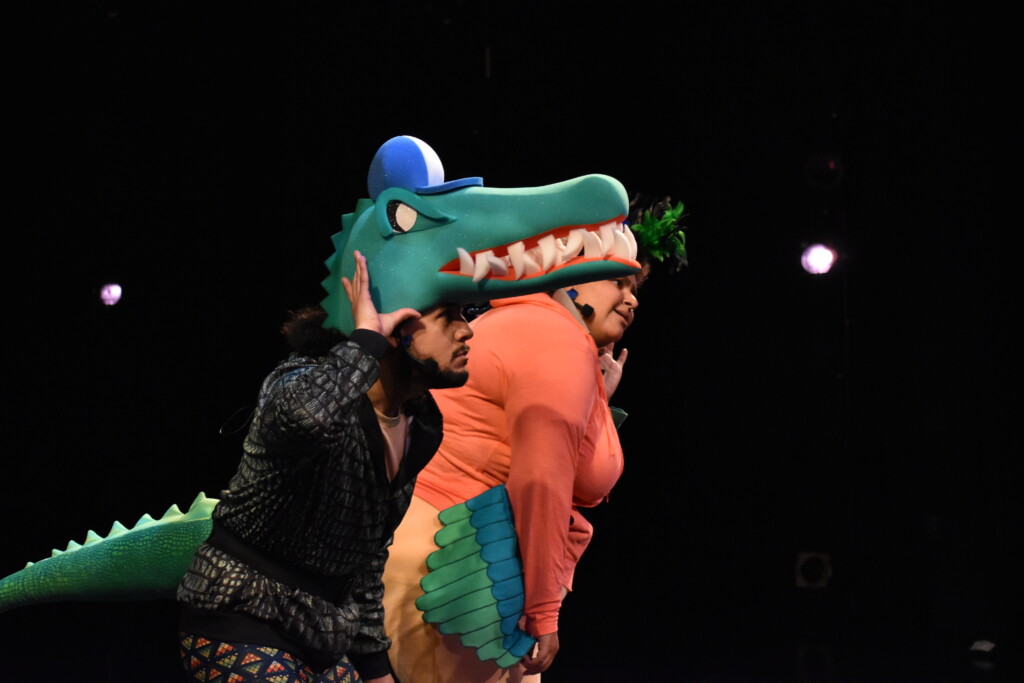Children attending school in Utah or the Intermountain West region might be surprised to learn that even in the southernmost Rio Grande River Valley, alligators and herons have been known to congregate together. In Alli and #3, the latest children’s play in Plan-B Theatre’s Free Elementary School Tour program (FEST), Alli is an alligator who turns out to be quite a sharp observer of their surroundings, which are being affected by all sorts of environmental factors including climate. “Well, it’s lot hotter dan it used to be. And dryer. It hasn’t rained here in a long, long time,” Alli says. “And less snow in de mountains in de winter. Wit de heat, de water evaporates and de river goes down, and wit less rain and snow, it goes down more. Dat’s how it gets smaller.”
Playwright Debora Threedy, who recently retired from The University of Utah, after 30 years as a law professor, is well known for bringing historical figures and themes to the stage with credible impact as fictional treatments, thanks to deep research that highlights primary archival sources. In previous plays for Plan-B, she earned well-deserved critical praise for stories touching variously on the lives of Joe Hill, Everett Ruess, Wallace Stegner and the relationship between Thomas Jefferson and Sally Hemings. A Chicago area native, Threedy, whose passion for the theater always has been as strong as it has been for law, says she has enjoyed this latest opportunity to step out of familiar territory. She says in an interview with The Utah Review, “In 1974-75, I wrote a children’s play, which was an adaptation of The Land of Oz, the second book in the series by L. Frank Baum. I don’t have kids. I can know what a kid enjoys. More importantly, I was once a kid.”

Five years ago, Threedy wrote a play, which she says was a “disaster,” in which an earlier version of Alli — Alli Gator — was a character in one scene. But, the character apparently had the right appeal, which inspired Threedy to recast it for this latest work. As for the second character, #3, it became a heron, named accordingly because they were the third offspring to be born. “It took me forever to figure who would be a good second character, but it was kismet — serendipity — that resulted in #3,” she adds.
As for Alli’s accent with the pronunciation of the hard “th”, that is roughly based on Threedy’s experience during her law school days with a law professor, an Irishman who came from Chicago’s south side. In her instructions for the short play, which runs 25 minutes, Threedy writes, “There are any number of accents that feature this, including Cajun, some Irish neighborhoods of Chicago, Caribbean, some East Indian, Dublin Irish, etc., although it is not necessary to have a recognizable accent – just a hard ‘th.’ Care should be taken that the accent does not read as a negative reflection of Alli’s intelligence and that it does not perpetuate any stereotypes.”

Threedy lives in southern Utah and can step outside and walk on land under the stewardship of the U.S. Bureau of Land Management to see the Pine Valley Mountains. Writing Alli and #3, thus, seems natural for a playwright who wrote a work for the stage about Everett Ruess and the mystery surrounding his short life, a subject she continues to explore. Therefore, she considers it “incredibly important” to bring the natural world home to a new generation of elementary school students whose lives certainly will be dominated by the significant environmental changes and climate science that are transforming the landscape in which they live. The characters of Alli and #3 are alarmed by and trying to adapt to changes in their natural surroundings that once were believed to be safe and untouched because the human footprint was so small.
As with every Plan-B FEST-produced play, Alli and #3, geared toward children in grades K-3, provides the ideal materials to introduce the subject about what is happening with natural landscapes as it relates to climate. More importantly, the play offers a platform that avoids the dramatic politically driven controversies surrounding questions of whether or not the topic should even be introduced to elementary school students. Threedy says she approached the challenge by answering the question, “How do we introduce changing world without making it too scary?” As she explains, the fires in the West can be scary for children as can be representation of pollution and toxins in the air so she settled on portraying how the river that Alli and #3 depend upon is gradually disappearing. It strikes a gentler balance – an exercise she describes as a “tightrope walking act” — that preserves the seriousness of the issue while not framing the consequences in a way that frightens young minds. Threedy’s research also uncovered that, in fact, alligators and herons had (and have) cohabitated near the Rio Grande.
The production, directed by Jerry Rapier and the ninth in the FEST program, is available for live stage performances at Utah schools (through May 27, 2022), contingent upon following strict COVID-19 protocols. Public performances may be scheduled as well during the future, contingent upon pandemic news. It also will be available, by Sept. 7, as a podcast, with sound design by Cheryl Cluff, and as a video, with audio recording and mastering by David Evanoff. Prior to the play, students are introduced briefly to the basics of theater along with a few interactive moments that occur in the play. The performance concludes with a brief talkback encouraging young audience members to share what they learned from the play.
There are two rotating casts for the production: Talia Heiss (Alli) and Benjamin Young (#3) and Pedro Flores (Alli) and Sammee James (#3). Arika Schockmel handled production design.
In addition, each school which books the FEST production in any of its available formats will receive a copy of a new children’s book Cleo and the Climate for its library. Written by Sharah Meservy, Plan-B’s education coordinator, and illustrated by Avery Franklin, the story features a Utah family where mother and grandmother are scientists (entomologist and biologist) and siblings Cleo and Miles along with their father are just as passionate about science.
The story encourages curiosity and creativity about the scientific process, including how experiments are carried out and why asking questions never becomes tiresome when one is trying to explain changes in nature and the landscape. The story brings in familiar natural sites in Utah and introduces to the science of greenhouse gases, differences between weather and climate, NASA and the experience of visiting science museums.
For more information about the program and for booking information, see the direct Plan-B website link.


